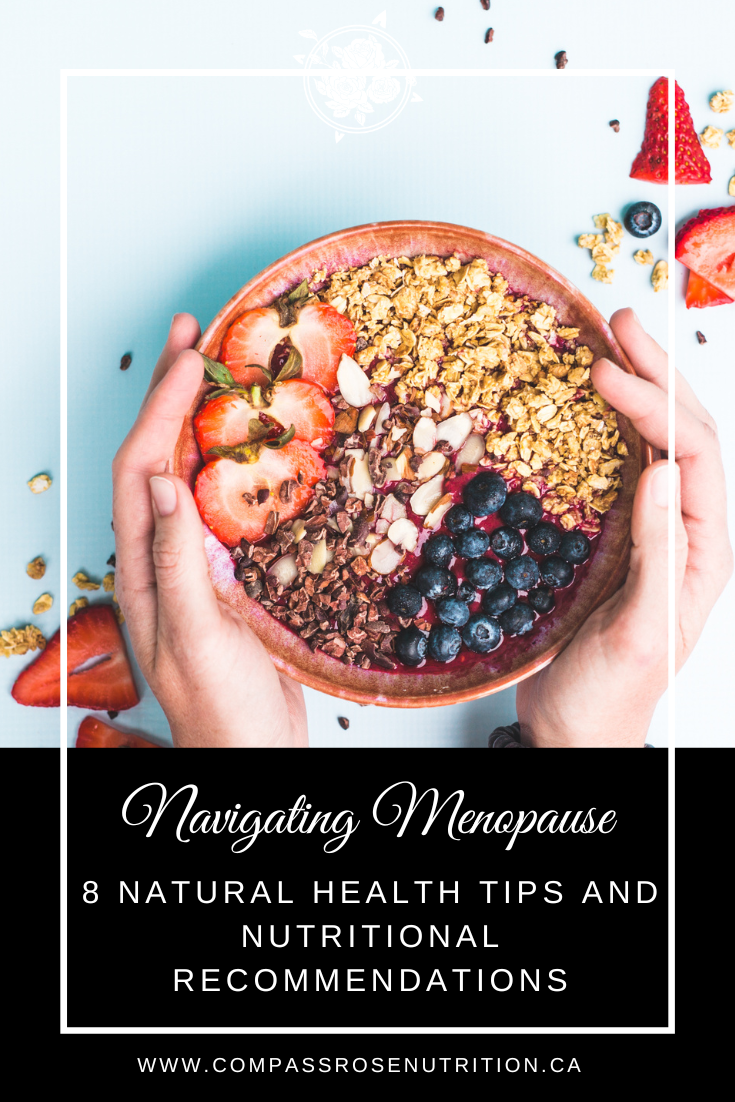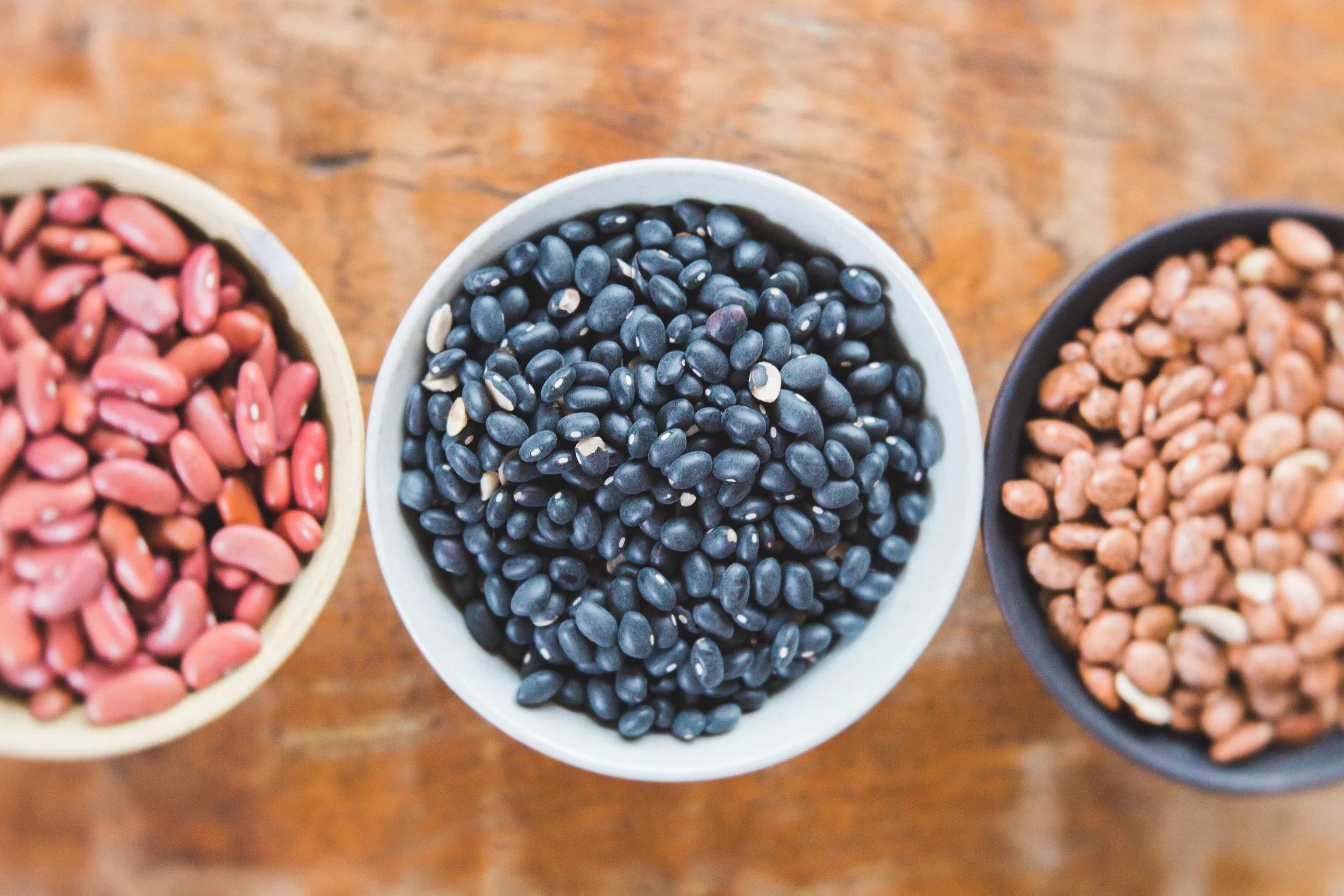Menopause is a natural transition that all women will experience at some point in their lives- usually in their 40’s or 50’s.
Although it is a completely normal part of aging, the physical and emotional changes that come with menopause can be challenging to navigate. Many women experience symptoms such as hot flashes, mood swings, sleep disturbances, and weight gain - all of which can interfere with daily life.
Fortunately, there are many natural options that women can incorporate into their lives to help manage these symptoms. What you eat and how you move can make a HUGE improvement in some of the symptoms of menopause and it can also help reduce other health problems like heart disease, diabetes and osteoporosis.
In this blog, we will explore some of the most effective natural strategies for managing menopause symptoms, especially weight gain. Let’s start there.
During menopause, many women tend to gain weight, and there’s two main reasons why this happens.
Reason #1
Reduced muscle mass. Muscle mass uses energy (burns calories) so when we have less of it the body burns less energy overall, leading to weight gain. Unfortunately, this weight gain may appear as increased belly fat.
Reason #2
During menopause there is an increase in the hunger hormone “ghrelin”. With an increase in this hormone comes the tendency is to feel hungrier. Menopause also decreased the “satiety” hormone “leptin” that helps us feel full after eating which can lead to overeating.
More ghrelin and less leptin = increased hunger and a decreased feeling of fullness...that’s a problem and it’s why you hear that it’s important to BALANCE hormones. We need all of our hormones, we just need them to work well together.
here are 8 health recommendations to eat better, move more and balance your hormones for a smoother menopause.
1) Hydrate: Drink more water.
The goal is to drink around 8-10 glasses per day. Or at minimum, make sure you are drinking water throughout the day so that you are not thirsty.
If you struggle to drink water, try having a full glass first thing in the morning before you eat or drink anything, add in some berries or chopped frozen fruit. You can also keep a large bottle or mug beside you all day wherever you work so it's always easy to grab and have sips throughout the day to make sure you're not getting thirsty.
Prefer tea? Steep some sliced lemon and/or ginger or your favourite caffeine-free herbal tea bag. This counts toward hydration as well.
2) Eat a healthy breakfast
Eating the right type of breakfast has been shown to help maintain muscle mass, balance levels of leptin and ghrelin, aid weight loss and maintain that lower weight.
What makes a food “optimal” for breakfast in menopause? Foods that help to increase metabolic rate, fill you up, and keep you feeling fuller longer. Read onto step 3 + 4.
3) Eat lots of whole plant foods and fibre
Fibre is very important to help stabilize your blood sugars to reduce cravings. The reason this is particularly important in menopause is because the risk of diabetes and heart disease increases after menopause due to an accumulation of visceral fat in the abdomen (belly fat).
Plant-based diets are also associated with fewer hot flashes.
Plus, certain fibres you eat actually feed your friendly gut microbes, and we know that gut health is so important to maintain for long term health. These help you digest food and even make certain nutrients for you.
Which foods are high in fibre?
Eat more food like vegetables, fruits, beans, nuts and seeds. Try to include them in every meal and even most (if not all) of your snacks.
Here are just a few of the items you could add to your diet to increase fibre intake.
Vegetables (squash, peas, sweet potato, artichokes, collard greens, pumpkin, parsnips, Brussels sprouts etc.)
Fruit (pears, avocados, blueberries, raspberries, blackberries etc.)
Nuts (almonds, pistachios, macadamia, hazelnuts, pecans, Brazil nuts, walnuts, dried coconut etc.)
Seeds (sesame, sunflower, pumpkin, chia, flax etc.)
Gluten-free grains (oat, quinoa, wild rice etc.)
Beans and lentils
Note- I want to highlight the importance of some of your daily fibre from flax. Flax not only contains fibre but it is also a source of protein and omega-3 fatty acids. Flax has even been shown to help reduce both hot flashes and the risk of breast cancer.
4) Include high-quality protein
Eating protein is critical for women in menopause. Protein helps to:
slightly increase metabolism and give your muscles the amino acids they need to stay strong.
keep you feeling fuller longer which is great to try to offset that hunger hormone known as “ghrelin”.
reduce bone loss that can happen very fast during this time.
Make sure to get protein in the mornings.
Which foods are high in protein?
Meat and poultry
Fish and shellfish
Eggs
Beans and lentils
Nuts and seeds + their butters (contain more fat than protein but still a great source of amino acids)
With animal foods we're aiming for quality so try to get organic, wild, and/or pasture-raised if you can.
5) Reduce or Eliminate
Reducing and/or eliminating alcohol, caffeine and processed foods can have a tremendous impact on balancing your hormones naturally..
With those increases in hydration, whole plant foods, and quality protein, you simply won't have as much room for alcohol, caffeine, and processed foods with added salt and sugar.
6) Move your body
Be sure to get regular exercise as you head into menopause and beyond. If you don’t already get very much exercise, try and move up to 5 hours per week. Once you hit that goal, gradually increase it a bit further.
Include a variety of exercise- walking (especially outdoors in the sun, if possible), water aerobics or even some weight-training is great.
*remember check with a doctor before starting any new workout program
7) Get enough sleep
Sometimes menopause can bring on (or ramp up) sleep problems. Set a goal to get about 7-9 hours per night. That may seem like a lot if you are someone who doesn’t sleep well- but it’s important for your body to rest and recover during those bedtime hours.
If you need some help with your sleep, try these:
set a daily routine where you're relaxing with no screen-time (computers, tablet, phone, tv) a couple hours before your bedtime. Electronic devices emit strong blue light which can prevent the release of melatonin, your sleep hormone.
try reading a book- this is a great way to forget about your day, stay off electronics and wind down from the day
have a bath - include some epsom salts or essential oils and set yourself up for some serious relaxation before bedtime.
8) Find great stress relieving activities
Have you tried meditating, deep breathing, or having a warm bath? You could even go for a walk. What about coloring? It doesn’t matter what it is, just find something that works for you. Make sure you do it regularly as a preventative measure to avoid accumulated stress.
In conclusion, there are several natural health tips and food recommendations that women can incorporate into their lives to help manage the symptoms of menopause.
Remember, everyone's experience with menopause is unique, and it is important to listen to your body and consult with a healthcare provider to find the best strategies for managing your symptoms.
By making some simple lifestyle changes and being kind to yourself during this transitional period, you can help ease the symptoms of menopause and continue to live your best life.
I run a monthly membership group for women who are ready to prioritize their health and learn about nutrition and lifestyle changes that support them- you can learn more and join us here: Nourish For Life
Related Reading:
Simple Plant Based Breakfasts That Are Ready In Minutes
The Four Pillars of Health (Pillar 3- Sleep)
The Four Pillars Of Health (Pillar 2- Exercise)
References:
https://authoritynutrition.com/leptin-101/
http://nutritionfacts.org/video/just-the-flax-maam/





